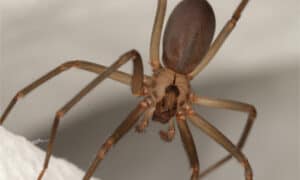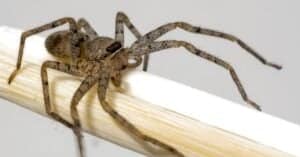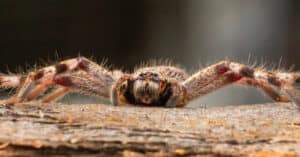Most people have been stung by a bee or bitten by a bug. But spider bites are pretty rare. And if one does bite you, it’s usually not a big deal. But some spider bites are much more serious than others. Just the mere thought of a brown recluse biting you or a loved one may be enough to give you an anxiety attack. And if you’re like most stressed-out human beings, internet research can either help ease your nerves or give you a full-on panic attack. What does a brown recluse bite look like? Find out now, including its appearance in various stages and what happens if you don’t get it treated.
How to Identify a Brown Recluse
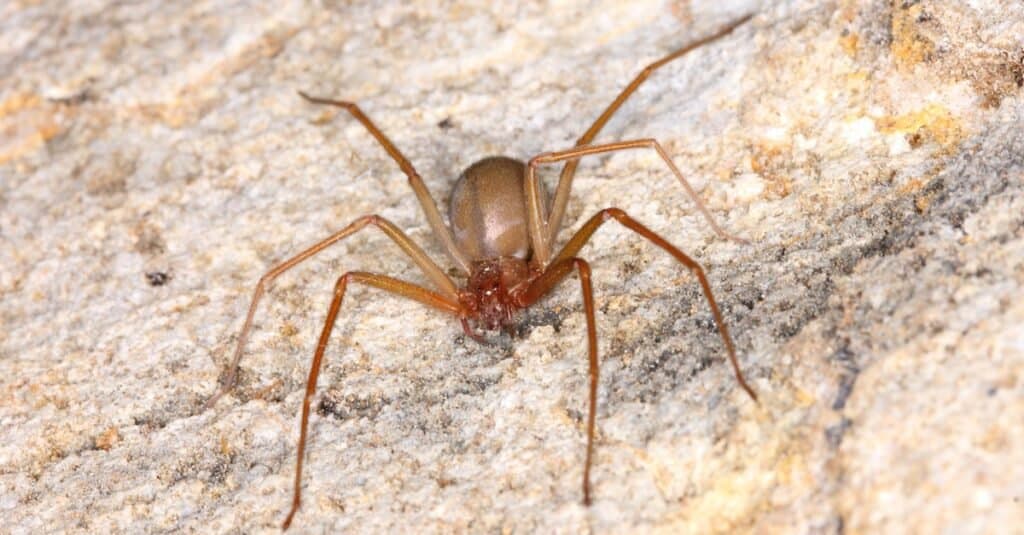
The brown recluse spider is one of the most dangerous spiders in the United States. Their eyes are distinguishable from other species.
©Pong Wira/Shutterstock.com
The brown recluse belongs to the Sicariidae family and contains necrotic venom. It is one of the few spiders in North America that produces medically significant venom.
They vary in size, but most are around two centimeters, about the size of a U.S. quarter. And thankfully, they have fairly discernible features. Their coloring can be tan to dark brown and plain, with no banding or mottling. The easiest way to determine if a spider is a brown recluse is to check for a violin-shaped marking on its back. The mark will be darker in color than the rest of the body, and the neck of the violin will point toward the spider’s abdomen. Their eyes are also distinguishable from other species. They have three groups of two eyes arranged in a half-moon shape.
Where is the Brown Recluse Commonly Found?
When outside, the brown recluse hides under rocks, woodpiles, and other debris. But inside, they can be in cardboard boxes, underneath piles of clothes, inside shoes, nestled in bedding, or hiding in storage spaces. They like dark, secluded areas, especially during daylight. But males can be somewhat more adventurous and move around, which is why you might find them in more common areas of your home.
What a Brown Recluse Bite Looks Like with Pictures
The brown recluse is not known for being aggressive, and a bite from one is very rare. But they will bite if they feel threatened, usually when pressed against your skin in your shoes or clothes. The initial bite may feel like a slight pinch similar to a bee sting or other bug bite. But it will increase in pain over time. You may not even be aware of the bite for several hours until the pain begins. The bite site typically becomes red, swollen, and tender. There may be a central blister that expands over days and weeks. Occasionally, bites can affect your system and cause fever, chills, dizziness, and vomiting.
Brown Recluse Bite Day One
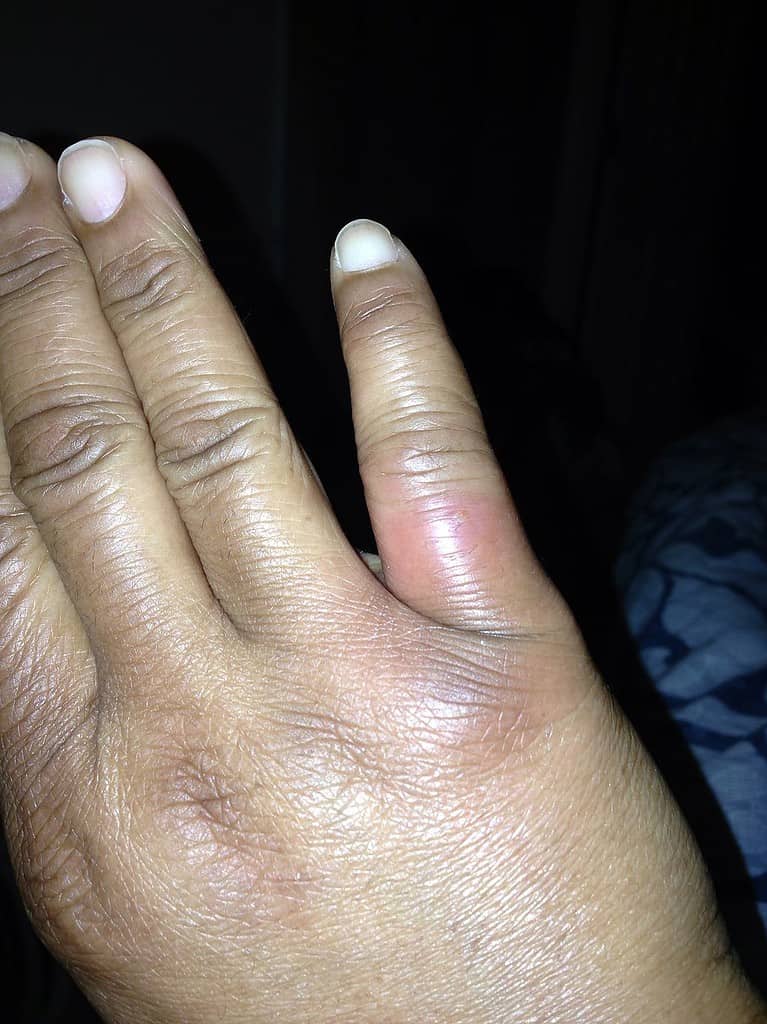
On day one you may feel some pain and the area will be red and swollen.
©CC BY-SA 3.0 – License
During day one, you may feel some pain after a few hours. The area around the bite will most likely be red, itchy, and inflamed.
Brown Recluse Bite After 24 Hours
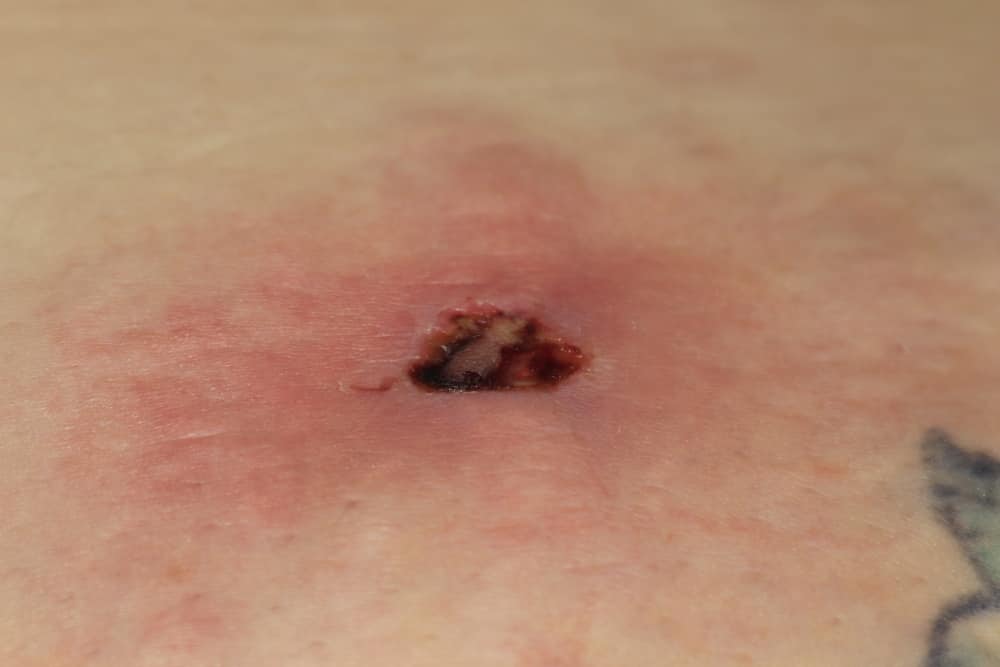
After 24 hours, the bite can turn colors, form an ulcer, and produce worse symptoms.
©Robert D Brozek/Shutterstock.com
It may turn bluish or purple in color or have a bulls-eye appearance. If this happens, skin death is likely to occur, especially if symptoms appear to get worse.
Brown Recluse Bite After a Few Days
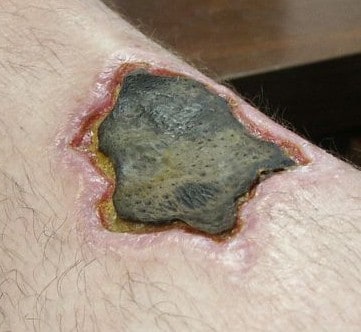
After several weeks, a thick, black scab forms.
©CC BY 2.0 – License
If venom was injected, you will begin to see an ulcer form in the center of the bite. Within a week, the ulcer can break down and becomes a deep wound. Most recluse bites will heal after three weeks and leave a thick, black scab.
What Happens if You Leave a Brown Recluse Bite Untreated?
Most brown recluse spider bites will heal on their own within a few weeks without medical care. But some people can develop necrotic lesions. It will appear as a blue patch with redness and swelling. The edges will be irregular and the center of the patch will be pale. The center will develop into a blister that destroys the tissue. Without treatment, the wound can expand, leaving long, deep scars. Children, the elderly, and immunocompromised people are more likely to have severe reactions to brown recluse bites.
Should I Go to the ER for a Brown Recluse Bite?
If you suspect you’ve been bitten by a brown recluse, elevate the wound, apply ice to the area, and seek immediate medical attention. Even if the bite does not become severe, it is better to be safe than sorry.
Note: AZ Animals does not attempt to give medical advice. If you or someone you know is bitten by a brown recluse, seek medical care immediately.
Bonus: How to Prevent Brown Recluse Spiders From Entering Your Home:

Ivy growing on your house may look charming – but too much of it can attract unwanted spiders.
Image: Peter Gudella, Shutterstock
©Peter Gudella/Shutterstock.com
It’s tough to rid your home of brown recluse spiders once you have an infestation – and we recommend calling a professional pest control agency for that situation. However, you can take a few steps to make sure they never come inside.
- Caulk to seal all cracks and crevices through which brown recluses can enter. Pay special attention to areas around windows, doors, vents, and utility pipes.
- Remove woodpiles and yard debris away from the side of your home. Spiders love to live in woodpiles so don’t store it close.
- Cut tall grass and any climbing ivy off the exterior walls of your house. Because brown recluses eat other insects – getting rid of plants that attract them is crucial.
- Keep up with general pest control around your home. Spraying barrier pest repellant around doors and windows and keeping the area around your house tidy will help to prevent infestations of any type.
The photo featured at the top of this post is © Nick626/Shutterstock.com
Thank you for reading! Have some feedback for us? Contact the AZ Animals editorial team.



